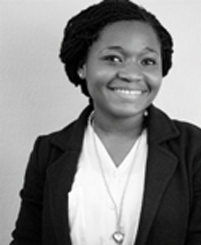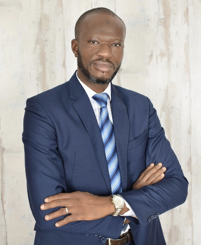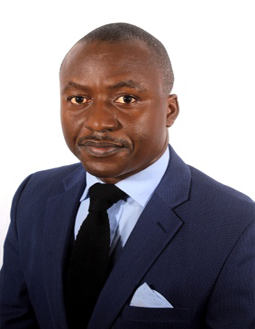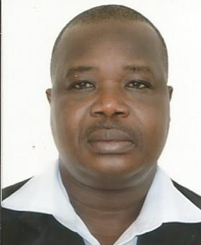|
|
A team of regional and national consultants is mobilised and working alongside the core team of DCAF, Swiss HSD/FDFA and CHEDS experts on Preventing Violent Extremism (PVE):
 |
Dr Séverin Kouamé Yao holds a doctorate in sociology from the University of Bouaké, Côte d'Ivoire (CI). Lecturer-researcher in the department of anthropology and sociology of this institution since the end of July 2007, he became interested, within the framework of his doctoral research, in local resilience and innovation capacities in rural economy in the context of a State's disengagement and weakness.
Diversifying his fields of scientific interest, Dr Kouamé Yao has conducted various post-doctoral research and consultancies on the livelihoods
|
|
|
of rural households in conflict areas on the one hand, and on state and non-state actors in the governance of “post-conflict” policies on the other hand. Specific themes include community rapprochement, the fight against poverty, and the promotion of population’s access to basic social services in the Center-North-West areas of CI. He has carried out and contributed to research projects and actions on the subjects of prevention of violent extremism and radicalisation in Côte d’Ivoire, Mali and Niger, specifically about the contextual factors of risk, and the routes and determinants to youth engagement in the trajectories leading to these new forms of violence. He currently plays the role of DCAF’s Regional Expert within the framework of the joint DCAF/DSH-DFAE/CHEDS research project on prevention of violent extremism, and engagement of defence and security forces.
|
|
 |
Ms. Kessy Martine Ekomo-Soignet has 10 years of experience in the field of development, research on peace and security issues, and more specifically youth and civil society in the Central African Republic.
She worked as a national consultant for the government of the Central African Republic in the development of its first national strategy for the prevention of radicalisation and violent extremism. Since then, she has helped the Strategy Implementation Committee by supporting training for the security forces and civil society. Kessy is also a member of the board
|
|
|
of iDove, an initiative of the African Union which aims to educate young people on issues related to radicalisation and violent extremism.
In 2016, she was appointed by the Secretary General of the United Nations as an expert for the Study on Progress on the youth, peace and security agenda, in accordance with the UNSC Resolution 2250.
National representative of the organisation PeaceDirect in the Central African Republic, she is also the founder of the local NGO "URU" (Sauter in French). She holds a Master 2 in Geopolitics, International Security and Sociology from the Catholic Institute of Paris.
|
|

|
Dr Sampala Balima is a political scientist, teaching researcher at Ouaga II University, where she is in charge of the Bachelor of Political Science, as well as a post-doctoral researcher associated with research centre LAM (Les Afriques dans le Monde) at Sciences Po Bordeaux. Dr Balima holds a Master 2 International Law from the University of Bordeaux. She works on public security policies in West Africa, and as such is regularly called upon for her expertise. She has worked with organisations such as OXFAM, the CDD (Center for Democracy and Development), and the CDG
|
|
|
(Center for Democratic Governance) around electoral issues and political leadership.
Dr Balima acts as national expert on the DCAF/DFAE/CHEDS project on Prevention of Violent Extremism.
|
|
|

|
Mr. Souleymane Cissoko is a public lawyer from Côte d'Ivoire (CI). He holds a Master's degree in Legal and Political Sciences. Specialist in electoral matters, he is involved in several national initiatives relating to questions of terrorism and violent extremism.
Expert and trainer for Ivorian intelligence agents on radicalisation, violent extremism and terrorism, he is a member of the working group for the development of the National Strategy to Combat Terrorism. He participated in the production of the report on the financing of terrorism
|
|
|
and the proliferation of weapons of mass destruction as well as in the design of the educational kit (tool for detecting signs of violent radicalisation linked to Islam).
Mr. Cissoko has been recruited as a DCAF national expert within the framework of the regional study relating to the examination of the conceptual, political, legislative, doctrinal and operational frameworks for PVE and engagement of SDFs in Côte d'Ivoire.
|
|
| |
|
|

|
Major Michael Naah is a senior military officer of the Ghana Armed Forces with over 10 years of progressively responsible experience in Threat/ Security Information Analysis; Public Administration; Preventing Violent Extremism (PVE) and Terrorism; Planning and Coordination; and Peace Support Operations. This includes experience in West Africa, working with a broad range of local, national and international stakeholders in Ghana, Liberia, South Sudan, Mali, Togo, and Burkina Faso. He has also participated in United Nation Field Missions in Liberia (UNMIL), South Sudan (UNMISS) and Mali (MINUSMA).
|
|
Over the past years, he has been actively engaged in analysing trends on violent extremism and terrorism. As a Focal Point Officer on PVEs, he has been part of initiatives and frameworks for PVEs in Ghana. He is also a member of the Human Security Research Centre Ghana (HSRCGh).
He holds a Master of Science Degree in International Security with concentration on African Security and International Project Management from the Paris School of International Affairs - Sciences PO and a Commonwealth Executive Master in Public Administration from the Kwame Nkrumah University of Science and Technology, Ghana. Prior to that, he graduated with a first class honours from the University of Ghana with a Bachelor of Arts degree in Psychology and Political Science.
Michael acts as a DCAF national expert within the framework of the regional study relating to the examination of the conceptual, political, legislative, doctrinal and operational frameworks for PVE and engagement of SDFs in Ghana.
|
|
| |
|
 |
Mr. Nakmak Douti holds a Master’s Degree in Political Science from the University Cheick Anta Diop in Senegal and is a PhD candidate working on “The Foundations of Security Sector Governance in Togo: An Essay on Defence and Security Policies from Independence to Today".
His educational background and varied experience in programme design, implementation, monitoring and evaluation with diverse stakeholders have equipped him with relevant know-how, managerial, operational skills and
|
|
|
experience in result-based programme/institution management in the fields of governance, policy advice, institution building, peacebuilding, human security, etc. Nakmak Douti is a resource person in development programming and human rights-based approach with over 20 years of professional experience at national and international levels in broader governance agenda with focus on security sector governance issues as well as violent extremism prevention.
He collaborated with USAID, EU, Institute for Security Studies (ISS), The Togolese inter-ministerial committee for prevention and fight against violent extremism (CIPLEV) and relevant CSOs dealing with VE issues such as WANEP, ELVA Community Engagement to help reducing the propagation of violent extremism.
Mr. Douti acts as national consultant in Togo on the present DCAF/DFAE/CHEDS project.
|
|
| |
|
 |
General Célestin Guidimey, a graduate of the Ecole Nationale Supérieure de la Police de St-Cyr-au-Mont-d'Or (France), also holds a license in public law (University of Abomey-Calavi) and several other diplomas and certificates in criminal police, intelligence, evaluation of security policies and the fight against terrorism. He has held senior positions in security in particular, including deputy director general of the National Police of Benin, Director of internal intelligence, Technical advisor to the Minister of Security and Central director of the judicial police.
|
|
|
International security consultant, General Guidimey has participated in the development of several policy documents and security strategies in Benin. He is the vice-chairman of the expert committee that provides advisory support to the Head of State on security, reform and governance issues in the Beninese security sector. He is currently working on revising and adapting to emerging threats the legislative and regulatory frameworks for Security and Defence Forces. Since 2018, he has been the police technical advisor for a consortium of American NGOs operating in the Sahel on the themes of security, terrorism and violent extremism.
He plays the role of DCAF’s national consultant in Benin in the context of the project on the engagement of SDF for the prevention of violent extremism.
|
|
| |
|
|